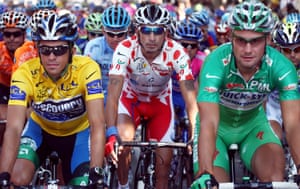Alberto Contador’s announcement on Monday morning that he will hang up his wheels at the end of the Vuelta a España surprised only for its timing. The question of when and how to quit cycling has been hanging in the air around the Spaniard for almost two years; he speculated he might end his career in 2016 but an unhappy spell riding for Tinkoff prompted him to hang on for another season.
Contador then speculated he might continue into 2018, before posting an Instagram video on Monday morning in which the 34-year-old stated the Vuelta would be “my last professional race. I say that with joy, without the slightest sadness. It’s a decision that I come to after mature reflection and I don’t think there can be a better way to say goodbye than at a race in your own country.”
He retires as one of six riders to have won all three grand tours. He was also the youngest and the quickest to achieve the feat, managing it before the age of 25 and in only 15 months. He remains the most successful grand tour rider of his generation, with two victories each in the Giro and Tour, and three in the Vuelta. Bernard Hinault is the only other man to win each more than once.
Much of the earlier part of his career was mired in controversy and he departs as an embodiment of the contradictions and doubts that have underpinned his sport in the post-Lance Armstrong era, as – it is universally hoped – cycling attempts to leave the years of industrial-scale doping behind.
In February 2012, Contador was banned for two years at the end of a 585-day battle to clear his name after traces of the banned steroid clenbuterol were found in his urine. He never disputed the finding but claimed the substance must have been contained in contaminated beef (the Basque government’s submission in the case suggested it was probably solomillo veal and that the animal would have weighed 290kg).
It was never established whether Contador had doped – a theory that the clenbuterol might have entered his system via a contaminated blood bag was never proven – and the court of arbitration for sport concluded the drug most probably had been ingested through a contaminated food supplement. What mattered was the principle of strict liability: for anti-doping to work, the athlete has ultimately to be held responsible for what is in his or her system whether or not doping is proven.
It was hard to avoid the sense Contador was also paying the price – morally at least – for his links to two of cycling’s most notorious doping directeurs sportifs: Manolo Saiz, with whom he turned professional in 2003, and Johan Bruyneel, who picked him up when Saiz’s Liberty Seguros team went bust in the wake of the 2006 Operation Puerto blood doping scandal, in which Contador was initially implicated but ultimately cleared.

Under Bruyneel, at Discovery Channel, Contador emerged the winner in 2007 of one of the most controversial Tours de France of recent years, taking over the yellow jersey after Michael Rasmussen’s midnight flit. In 2008, having moved to the Astana team, he – and his team – were refused entry to the Tour de France following the Kazakh squad’s doping history. Instead, he was famously called in from a beach holiday to ride the Giro d’Italia, which he won, adding the Vuelta later that year.
And 2009 saw his battle against Armstrong, who had returned from retirement to jointly lead Astana, in the Tour de France, and 2010 a third Tour win, after a much debated attack on the race leader Andy Schleck in the Pyrenees when the latter derailed his chain at a key moment. That victory was taken away from him following the clenbuterol verdict, as was his overall title in the 2011 Giro.
When Contador turned up to start the 2011 Tour a few weeks later, the defending champion only in a provisional sense as the clenbuterol case was continuing, he faced a chorus of boos at the team presentation. He accepted his reception with dignity, so too the clenbuterol ban when it came, and on his return began to achieve something approaching redemption with attacking racing that led to a pair of Vuelta wins and a 2015 Giro victory; most memorably, a dramatic long-distance move at Fuente De that turned the 2012 Vuelta in his favour.
In the Tour, Contador rarely appeared at his best after the ban, often crashing out, often attacking spectacularly to no great effect. In his final one last month he made a mark on the race with well-calculated attacks en route to Foix and Serre Chevalier, but never looked as if he would threaten for the podium. It was hard to avoid the slightly poignant sense here was a man bravely but fruitlessly chasing the form that had marked his youth. Clearly, since the Tour, reality has set in.
Winners of all three grand tours
Jacques Anquetil (TDF: 1957, 1961, 1962, 1963, 1964; Giro: 1960, 1964; Vuelta: 1963)
Felice Gimondi (TDF: 1965; Giro: 1967, 1969, 1976; Vuelta: 1968)
Eddy Merckx (TDF: 1969, 1970, 1971, 1972, 1974; Giro: 1968, 1970, 1972, 1973, 1974; Vuelta: 1963)
Bernard Hinault (TDF: 1978, 1979, 1981, 1982, 1985; Giro: 1980, 1982, 1985; Vuelta: 1978, 1983)
Alberto Contador (TDF: 2007, 2009; Giro: 2008, 2015; Vuelta: 2008, 2012, 2014)
Vincenzo Nibali (TDF: 2014; Giro: 2013, 2016; Vuelta: 2010)



